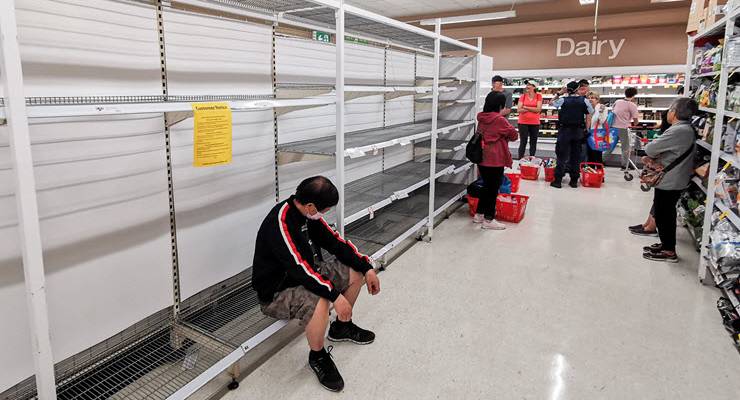
What happens if we keep reporting COVID-19 the way we are? Take these headlines, published yesterday:
- “Over 100 forced to isolate after second hotel quarantine worker tests positive for COVID-19”
- “Hotel worker tests positive for coronavirus”
- “Sydney and Melbourne on alert over COVID cases as Australian Open begins”
- “Quarantine crackdown”
- “One positive case after leaving NSW quarantine”
- “UK passengers could have to take FOUR coronavirus tests — and pay for them all”
- “Extra troops on their way to Victoria to help bolster hotel quarantine.”
Two issues should leap out at all of us. Firstly, the absolute lack of humanity that now dominates coverage focused on international deaths, tests, air-conditioning systems and quarantine breaches.
Where are the people at the centre of all of this?
The face of the young medico in the US who has worked weeks straight before succumbing to the disease she was desperate to stop?
The condition of the Victorian hotel worker confirmed to have the UK strain?
The Sydney school teacher who spends his day calming the fears of 10-year-olds, who don’t know how to live with certainty in an age of uncertainty?
The Adelaide mother who can’t access a psychologist because, despite more funding, slots are filling up months in advance. What is she doing, in this moment? Who is supporting her?
Ironically our national debate has lost the emotion so important to how we must respond moving forward. It’s now become a contest of state v state over borders and tourism numbers and local government areas and quarantine rules.
The risk is that — especially if this continues on for much of 2021 — we forget the heartache behind those figures and quarantine breaches. We see a story about numbers and not people’s lives; a story about the UK and America and Europe and not our own backyard.
A few short months ago we were lining up to pay for the coffee of the nurse standing in front of us. We were routinely paying for the groceries of the elderly man struggling with his mask. Good people handed their toilet paper purchase to those less able to fight someone in a supermarket aisle.
Evidence of that kindness is now harder to see, and rarer to read about. The risk in all that is in how we treat each other, how we calm the fears of our children and deal with those isolated from their work colleagues.
But the second issue that deserves attention is the ratcheting up of alarm.
Troops rushing in. Mutant UK strains. Snap restrictions. Dangerous air-conditioning. We are privileged, so far, not to have this pandemic take the number of lives we’ve seen elsewhere; a combination of our geographic isolation, local decision-making and perhaps even a dose of good luck.
But we can’t afford the daily pandemic news to become like political wallpaper on our radios and mobile phone feeds. If we continue to fill our discussion with national alarm, we risk people turning off when it counts.
How our leaders handle this is paramount. How we respond is even more important.








The stripping of super-market shelves to stock-pile : while others went without? Repeated in Perth a week or so ago?
Those headlines – which outlet’s?
The “ratcheting up of alarm”?
Those “10 year olds”? Been reading the papers, watching the news – with the media’s “sensationalist priorities”?
The “media’s role” in this perceived “devolution” of empathy? Particularly in the sensationalist stable for which King was paid to do her bit, playing conservative politics for years? Doing much the same thing – establishing the “normalcy” of such a media business model – to sell copy – to benefit Rupert?
Thank you for writing this. It’s why I found Tom Cowie’s story in the Age about the Melbourne man going shopping when he didn’t know he was infected so distasteful. Gay Alcorn’s comment on the story as “lighthearted” was even worse.
We need more empathy in media coverage of not just the virus, but all human tragedies.
“But we can’t afford the daily pandemic news to become like political wallpaper on our radios and mobile phone feeds. ”
Wow, 12 months in and someone in the media starts to think that wall to wall panic coverage may be having a deleterious effect. Extraordinary!
It’s hardly news is it, the modus operandi of Australian political media?
It has been observed how not only media is hollowed out and centralised, along with govt., promoting policy talking points, but the avoidance of linking ‘humanity’ or society, especially to negative policies and/or themes.
For example, LNP policy creating media black outs on interned refugees on the basis of ‘security’ when it’s more about sustaining white nativist messaging for negative ‘humanity’ and emotions; do not humanise the target of attacks (same in 1930s Germany).
On the other hand, emotions and humanity are central to e.g. legacy media news and ABC News 24 seeks out safe scary negatives e.g. bushfires, disasters, droughts etc.; lots of tragedy and crying in support of Oz themes or stereotypes.
Hence, we see little if any informed news, let alone positives, about refugees/immigrants, unions, diversity or multiculturalism, minorities, environment etc. as research tells political pollsters and PR types that positives or optimism do not motivate voters, the right way…. i.e. need for people to vote against the centre and left….
Could it be because of the human condition, or how humans are conditioned by a prevailing narrative ?
When someone dies there is a lot of response for the grieving ones, but peters out in time.
Bushfires, earthquakes, plane crashes, all end up the same in the news.
I am not surprised for a lack of empathy in the news, it just becomes something to report on.